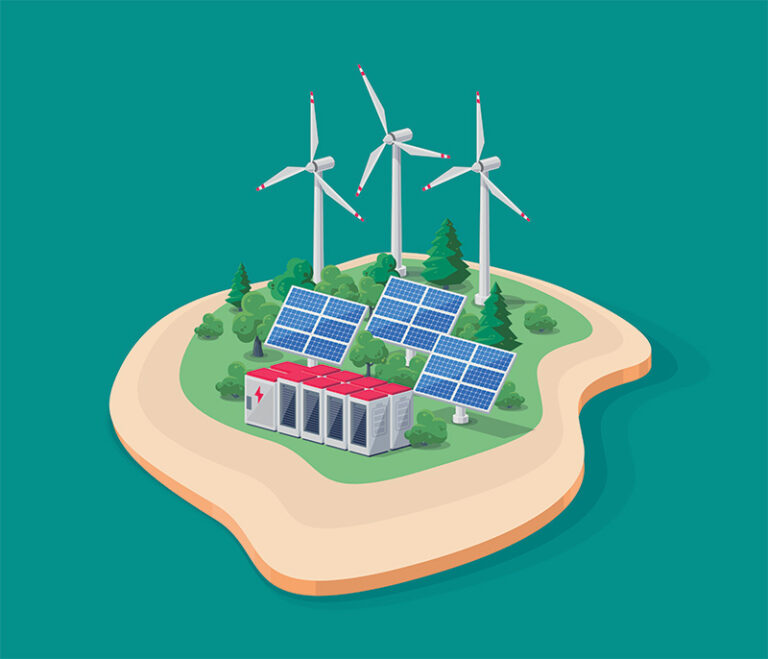
16 June 2022
A federally funded project examining the use of microgrids to bolster local energy resilience has selected eight sites across the Eurobodalla for further studies.
Bodalla, Broulee, Central Tilba and Tilba Tilba (treated together), Congo, Mystery Bay, Nelligen, South Durras, and Tuross Head represent a diverse cross section of the region and will provide learnings for regional communities across Australia.
The Southcoast microgrid Reliability Feasibility (SµRF) project is exploring the feasibility of microgrids in regional contexts that face challenges from events such as bushfires, in the Eurobodalla shire.
A microgrid is a small-scale electricity network that can be used as part or independent of the main electricity grid. They typically combine and rely on a variety of electricity sources, including solar, coupled with battery storage. Microgrids are expected to provide resilience when the mains power fails, and are becoming an important part of the energy mix for regional and remote communities.
“We hope this approach inspires other regional projects, policy makers, and funders to consider a wide range of factors in their efforts to boost resilience,” said Dr Bjorn Sturmberg, technical lead on the SµRF project with the Battery Storage and Grid Integration Program at The Australian National University (ANU).
“We wanted to make sure that we chose sites that would best address the need to build resilience. To do this, we developed an integrated approach that sought to assess the vulnerability of communities based on socio-economic factors, for example age or disability, as well as technical indicators such as historic data on power outages. It also assessed the ease of implementing a microgrid based on the amount of rooftop solar already installed in each location.”
Dr Hedda Ransan-Cooper, social science research leader with the ANU Battery Storage and Grid Integration Program said: “As new technologies are considered, we need to make sure we do solve the problems the technology is supposed to address taking into account local priorities. So, if the overall aim is for grid-tied microgrids to boost regional resilience, then we really need to take into account the differences between communities, in terms of who lives in them and what infrastructure is already there.”
The team considered issues like consultation fatigue (especially pertinent in the wake of the investigations into the Black Summer fires), cultural and ethnic diversity, and the layout of the town and electricity network (expanse, density, and network topology). The combinations of sites were assessed to ensure the project could cover the diversity of the region and, as much as possible, of regional Australia. The selected sites include small communities of less than 100 residents, medium townships of around 300 residents, to the region’s larger towns with approximately 2000 residents.
The selected sites all ranked highly in terms of vulnerability (e.g. high residential occupancy rates, lots of elderly, people with disability, numerous critical loads) as well as having high rates of solar installs and at least one microgrid option that is relatively tractable.
Luke Jenner, Essential Energy’s Chief Operating Officer, said: “Microgrids will undoubtedly form a part of our broader future network to help local communities work together to access more resilient, cleaner and cheaper energy. Today’s announcement of the eight sites is a key milestone to progressing our understanding of how this may look in the future and more importantly, to working with these local communities to learn how this type of technology may best support them.”
Kathryn Maxwell President of the Southcoast Health and Sustainabiliy Alliance (SHASA), said: “Decentralising our energy systems makes sense to SHASA if we are to keep energy affordable for our community. Producing and consuming electricity locally will also have significant economic benefits in terms of employment and keeping the money local. Now that this project has a focus on these areas of the Eurobodalla we can begin to understand what that energy system might look like from the communities’ point of view.”
The SµRF team will explore, from the community’s perspective, how the Eurobodalla could benefit from various microgrid designs, ranging from backup power for community shelters and essential services through to large systems servicing the whole of community. Research will also explore both policy and regulatory barriers to feasibility as well as other non-technical factors that will play an important role in ensuring that grid-tied microgrids truly meet people’s needs and expectations.
The project will seek input from residents, businesses and other groups in all eight communities to gauge their perspectives on different microgrid options and their preferences for how these systems could operate and whether this is a desirable option for people. ANU researchers will conduct in-depth social research in Nelligen and Tuross Head and members of the community group SASHA will engage with community members across the other six locations.
The sites were selected through a consortium-wide process of quantitative and qualitative analysis and consultation with the Eurobodalla Shire Council. The method used to collate these assessments and inform the selection decision is freely available here.
The project is funded by the Federal Government’s Regional and Remote Communities Reliability Fund. Project partners include: the Battery Storage and Grid Integration Program, Australian National University; Essential Energy; Southcoast Health and Sustainability Alliance and; Zepben.
Find out more about the SµRF project here.
Contacts:
Battery Storage and Grid Integration Program, ANU
Dr Bjorn Sturmberg, Research Leader (bjorn.sturmberg@anu.edu.au)
Dr Hedda Ransan-Cooper, Social Science Research Leader (hedda.ransan-cooper@anu.edu.au)
Essential Energy
Melanie Pope, PR and Community Manager (melanie.pope@essentialenergy.com.au)
M: 0418 160 031
Southcoast Health and Sustainability Alliance
Phil Shorten Community Engagement, mob 0438217916 phil@impartskills.onmicrosoft.com
Kathryn Maxwell President, mob 0467558645
